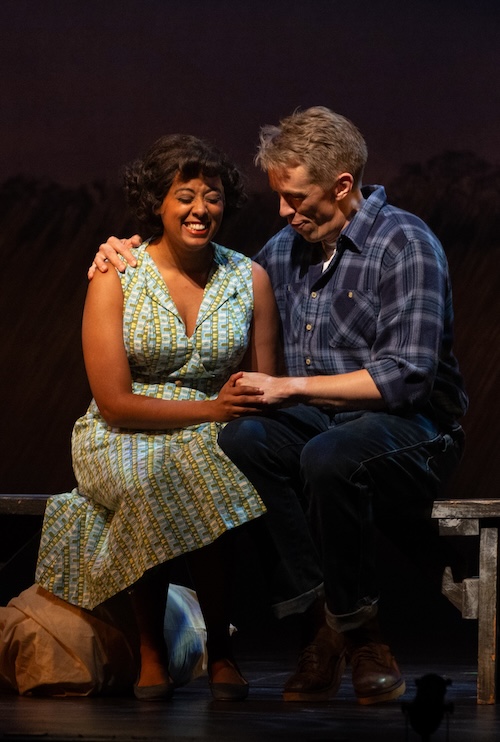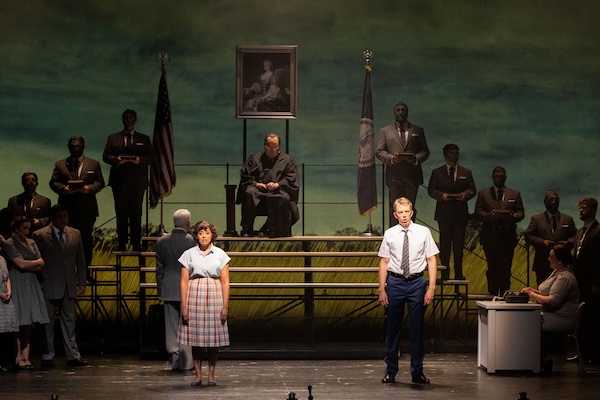Outstanding new opera, “Loving v. Virginia,” makes a moving debut

Virginia Opera is marking its golden anniversary season in the best way possible. The company, which divides its time among three Virginia cities, is performing the world premiere of an opera it co-commissioned with the Richmond Symphony, Loving v. Virginia by Damien Geter. As heard during the Sunday matinee at the GMU Center for the Arts in Fairfax, this full-length work proved to be one of the most successful new operas of the decade.
The title refers to a landmark case in the civil rights movement, decided unanimously by Earl Warren’s Supreme Court in 1967, striking down Virginia’s state law banning interracial marriage. The plaintiffs, Richard and Mildred Loving, were arrested and jailed by the sheriff in Caroline County, because he was white and she was black. They were later convicted, but the judge in the case suspended the sentence if they left Virginia. The Lovings, who moved temporarily to the District of Columbia, appealed the case to the U.S. Supreme Court, with the help of the ACLU.
Jessica Murphy Moo crafted a libretto that includes all of the relevant points of the story, while humanizing the characters and allowing moments of emotional expansion, so crucial to a good opera. Contrary to the approach of many contemporary composers and librettists, opera just does not work quite the same way as spoken theater. Music and non-recitative singing need to be given the upper hand, something that Murphy Moo’s libretto helped make possible.
Loving is the second opera for Damien Geter, the Virginia-born composer who is also an operatic baritone and interim music director of Portland Opera. Geter’s major oratorio An African American Requiem, performed by Choral Arts Society of Washington in 2022, demonstrated both his dramatic acumen and his skill in writing for voices. As in that work, Geter has woven music in vernacular styles—blues, rock, and spirituals—into this score yet in ways that felt organic and logical.
Flora Hawk led the cast as Mildred Loving, combining a self-effacing stage presence, suiting the attention-shy character, with a lyric soprano featuring exceptional tonal clarity, control of soft registers, and some scintillating high notes. Mildred’s aria in the Act I jail scene, “Daddy was right,” proved quite moving, as did her Act II lullaby, “The House Called Love,” sung to her daughter Peggy.
As Richard Loving, baritone Jonathan Michie had a rough, less beautiful sound, with occasional weakness toward the top of the range. Yet vocally and physically, he suited the character, a working man who enjoyed fixing and racing cars. He was at his best in the duets with Hawk, particularly the tense, unaccompanied passage after they accepted the condition of leaving Virginia to avoid going to jail for a year.
Mezzo-soprano Melody Wilson, heard in 2023 with Washington Concert Opera, had a fine turn as Mildred’s mother, Musiel Byrd Jeter, especially the emotional moment after she visited her daughter in jail (“My child, my beloved child”). Contralto Alissa Anderson gave an equally strong impression in the smaller role of Richard’s mother, Lola Allen Loving, in the duet with Richard “You tripped a wire, son.”
Phillip Bullock lent his polished baritone sound to the dignified role of Mildred’s father, Jake, while mezzo-soprano Tesia Kwarteng made a sassy Annette, Mildred’s bolder, more confident cousin. Tenor Benjamin Werley relished the dual villain roles of Sheriff Brooks and Judge Bazile, applying his biting, nasal voice to the visible face of justice applied unjustly. All three of these singers are former Herndon Foundation Emerging Artists with Virginia Opera.

Another former young artist, Troy Cook, provided some comic relief as Bernard Cohen, one of the ACLU lawyers, surpassed in vocal power by tenor Christian Sanders as his partner, Philip Hirschkop. The Virginia Opera chorus played crucial parts throughout the evening, with excellent intonation and ensemble unity, especially the male quartet that taunted Richard while he shared a prison cell with them.
Presiding over the pit was Virginia Opera’s talented music director, Adam Turner. His confident beat and careful coordination came across in the cohesion of vocal and instrumental forces. Guitar and drum kit added some distinctive sounds.
Mezzo-soprano Denyce Graves-Montgomery, who sang the previous evening on the other side of the Potomac, put on her opera director hat to direct a savvy, visually appealing production. (Graves’s husband, Robert Montgomery, is white, giving the story some personal resonance.) Minimal sets suggested the family’s home with furniture pieces and a roll-on door, and court buildings with a set of riser-like steps (scenic design by Mikiko Suzuki MacAdams). Jessica Jahn’s costumes effectively evoked the 1950s and 60s.
Geter’s score alternated between neo-romantic lush harmony and scoring and the pulsating rhythms of minimalism, mainly for transitions and active choral scenes. Geter chose to represent the impersonal machine of the law with a smaller semi-chorus, reciting legal cases and statues in a unison or octave monotone.
Graves heightened the effect of this musical choice by having the singers in that role wear gray masks that obscured their faces. When these robotic chorus members switched from chanting the old racist Virginia Code to the language of the Supreme Court ruling, it became a powerful symbol of hope for the future. Asked toward the opera’s end how she felt about the Supreme Court victory, Mildred replied simply, “I feel free,” which rightly got its own round of applause.
Loving v. Virginia runs through May 11, only in Richmond. vaopera.org